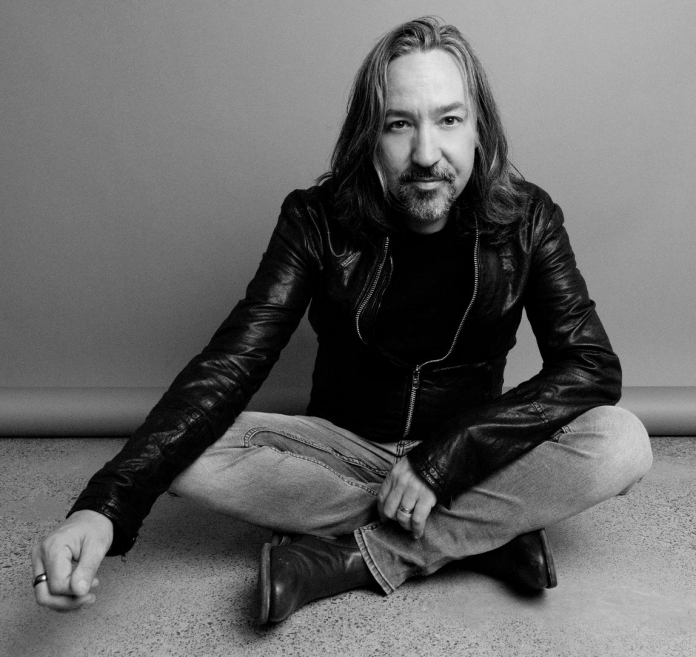
To celebrate New Zealand Music Month, The Courier has caught up with some of New Zealand’s biggest musical maestros, as well as some of South Canterbury’s own homegrown talent. In this week’s edition reporter Connor Haley talks with New Zealand Music Hall of Famer and Shihad frontman Jon Toogood.

Timaru is set for a time too good to miss as a member of New Zealand’s rock music royalty rolls into town to debut new songs from his upcoming solo album.
Jon Toogood, armed with just his trusty Martin acoustic guitar, will be playing an intimate set at the Landing Services Building on June 7.
He will also be accompanied by Timaru-born artist CAITLIN as the opening act.
The Shihad frontman and leader of the New Zealand supergroup The Adults said the content for his new album was born from a brutal Covid experience in Melbourne, in which he lost his mother and was unable to say goodbye in person, or even attend the funeral.
He was then locked away from his wife and children for three months while on tour in New Zealand when Omicron hit, and eventually caught Covid himself, leading to some unforeseen complications.
‘‘I have pre-existing tinnitus and I got this weird long-term Covid complication and it basically turned my tinnitus up to 20. I got woken up from a dream two weeks after getting Covid and it was like a car alarm going off in my head.
‘‘I didn’t sleep for 36 hours. I was trying to just run away from the sound, but I couldn’t because it was coming from me.
‘‘After going to the tinnitus clinic and trying out all these hearing aids that didn’t work, I ended up going to a cognitive behavioural therapist and that ended up helping me.’’
It was suggested that he wind down his nervous system through meditation — which, unfortunately for Toogood, required silence, a bit difficult with the tinnitus situation.
‘‘That didn’t work, so one thing she suggested was to play guitar, because that’s a mindfulness exercise.
‘‘So that was the genesis of starting to write and make sense of everything that had happened over the last three years.
‘‘I wanted to write something that communicated to people that it’s OK to find this whole situation crazy and that we’re still here.’’
He said at this stage in his career the smaller solo acoustic shows were almost as thrilling as packing out a stadium with Shihad.
‘‘Over the last 12 years I’ve got right into playing acoustic shows and just really enjoying that very human experience of being in a room with 100 people and just being able to talk to them.
‘‘I love Shihad, it’s great, it’s like riding a dragon, but I’m more of a master of ceremonies in that situation. But with these solo shows I actually get the chance to talk to people, take in who’s in the room, and it’s just a totally different way of performing live which I find quite thrilling.
‘‘I’ve spent my life having the weight of this huge PA, all these lights and all this sound and to make that magic happen without all of that stuff, I find you just make this real connection.’’
For Toogood the music landscape and even the world was forever changed by the impact of Covid, and he believed things were still recovering.
‘‘I think one thing we learned from Covid as musicians is you can’t rely on plans any more, you’ve just got to go ‘I’m playing here and if it happens it happens’. It’s a pain in the arse but in some ways it’s quite good to submit and realise you’re not in control.
‘‘I think it’s still pretty tough out there — I mean just look at groceries at the moment, I can understand people peeling things back to the necessity — but for me music is a necessity. That’s the bit that keeps me here.
‘‘There’s something about the communal experience of being in a room with a bunch of people you may or may not know but you’re all singing this song together that you’ve all had different experiences with.
‘‘All of sudden you just come together and think ‘it’s so good to be human’ and you just can’t replicate that online.’’
Having been a prominent New Zealand musician for more than 30 years, he said he believed New Zealand Music Month was still important for the industry.
‘‘Over my 33 years in the industry I think people’s experience and regard for New Zealand music is far greater than it was when I first started.
‘‘There’s lots of initiatives like Music Month and Rockquest that weren’t happening when we were at school, even the radio quotas.
‘‘If Music Month really focuses people on what’s in their back yard artistically, then that’s positive for everybody.
‘‘I think technology came around and meant young artists could record stuff that sounded as good as overseas, and that really helps.
‘‘When we were young and a band sounded like they were from overseas that was like ‘Faaar, they must have spent a million zillion bucks’.
‘‘Usually New Zealand artist recordings sounded a bit rattly — it was always great songs, but the recordings weren’t sonic and didn’t have the weight of the international stuff.’’
He said he would ‘‘definitely be playing some of this new stuff in Timaru, but then, like I’ve been doing at the other shows, we’ll turn it up to 11 and just have a big joyful sing-along of songs that people know and people love.
‘‘It’s a really cool night of music, it’s a good show.’’
Tickets can be purchased from the Undertheradar website.




